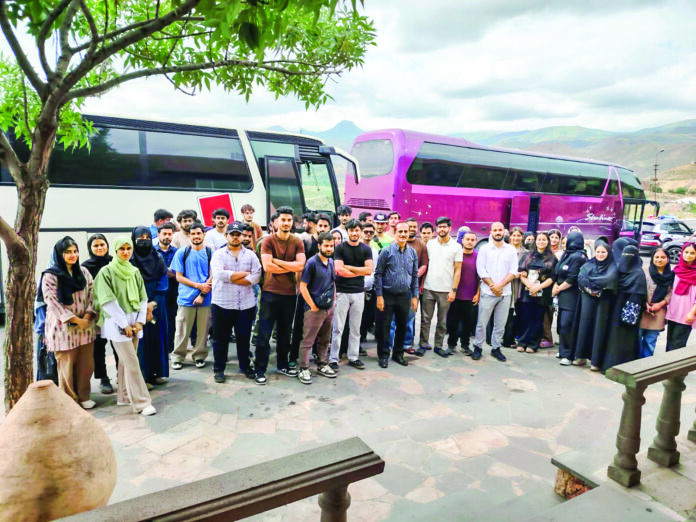
In the changing landscape of geopolitical alignments, a new alliance is forming in Eurasia with India in the middle of it.
Yerevan, Armenia: Yerevan, the capital of Armenia, achieved city status in 1879 and is one of the oldest continuously inhabited cities in the world. Yerevan wears its heritage with pride and modernity. A walk along the main square and its avenues bustling with high end stores, cafes and restaurants allows an impressive view of this modern capital in the South Caucasus. Armenia has a civilizational history as kingdoms have existed there since 9th century BC. In the year 301, Armenia became the first country in the world to adopt Christianity as a state religion.
Over the centuries it faced many invasions and attacks. In 1915, Armenia suffered a genocide of about 1.5 million people by the Turkish Ottoman Empire. From 1922 to 1991, it was a part of the Soviet Union as Armenian Soviet Socialist Republic.
Despite its tortured history, Armenia has grown into a resilient democracy that has built on its agricultural and technological strengths.
TECHNOLOGY AND TOURISM
Its path to modernity is well represented by the Engineering City, an innovation campus populated by high tech companies. Developed with support from World Bank and Government of Armenia, Engineering City is managed by a consortium of private companies. Within the campus are companies that are developing cutting edge tech solutions in sectors such as automation; semi-conductors; bio-medicals; aerospace; and scientific instrumentation.
According to investment promotion agency Enterprise Armenia, the tech sector output was over $2.6 billion last year, with over 45,000 people working in the area. For a country with just under 3 million population, a large number of professionals are engaged in technical vocation. “Armenia’s free economic zones offer a business-friendly environment with tax incentives and streamlined regulations, attracting investors and boosting the country’s economy,” the investment promotion agency says.
Tourism is another pillar of the economy. Ancient monastery Khor Virap, among the gems of the country that represents the deep cultural history of the region, is a popular destination for global visitors. Sevan Lake and the mountain city of Dilijan are two hours’ drive from capital Yerevan. The wines and agricultural products of Armenia are popular in global markets. International and local companies are keen to invest in local markets. Domestic developer firm Green Rock is developing several projects including a mega hotel complex in Dilijan as part of its focus on investing in social and economic infrastructure. “At Green Rock, we believe tourism can be a powerful driver for sustainable regional development. Dilijan, nestled between Yerevan and Tbilisi, is uniquely positioned to become both a transit destination for travellers and a thriving tourism hub. Beyond leisure, Dilijan also has tremendous potential to host MICE events—large-scale conferences, forums, and corporate gatherings. With the right infrastructure in place, it can attract international audiences year-round, significantly boosting the local economy and Armenia’s presence on the global event map,” says Katerina Danekina, CEO of Green Rock.
Armenia attracts tourists for adventure, cuisine and heritage experiences.
INVESTING IN A REGIONAL ALLIANCE
India has deepened its relations with Armenia in recent years. “Development cooperation has been a major component of our ties with Armenia,” India’s Ambassador to Armenia, Nilakshi Saha Sinha, said in a recent statement. Under the Indian Technical and Economic Cooperation Programme, several Armenians have undergone training. Armenia is also home to several medical colleges where thousands of Indian students study to become doctors.
Then, there is a security issue which is accelerating a dynamic alliance in the region. Being squeezed between two antagonistic neighbours is an unpleasant situation that India knows well. Armenia faces aggressive conflicts by its neighbours, Turkey and Azerbaijan. With support of Turkey, Azerbaijan has clashed and taken over important chunks of Armenia by force.
“Given its strategic location, Armenia is a balancing factor against Turkish expansionist policies and the pan-Turkic agenda in the South Caucasus and beyond, which carry security implications similarly for India. Due to its location, Armenia can serve as an alternative transit route from India to Europe,” says a report written by scholars Nvard Chalikyan; Benyamin Poghosyan; and Verej Isanians. The report was published by Observer Research Foundation (ORF) and Applied Policy Research Institute of Armenia (APRI Armenia).
India’s support of Armenia is driven by the need to counter the Turkey-Azerbaijan-Pakistan axis. In the recent conflict with Pakistan, Turkey and Azerbaijan took open positions against India.
The report further says, “Azerbaijan now criticizes India and France for supplying arms to Armenia, warning that it may take ‘serious measures’ if threatened. Both India and France have responded by saying it is their right to supply arms to a sovereign country. At the same time, Azerbaijan is continuing its military build-up, steadily increasing its national security and defence budget allocation from US$1.85 billion in 2018 to US$3.77 billion in 2024.” The scholars say that Turkey and Azerbaijan are “One Nation Two States” as a result of their joint cooperation on armed forces and arms manufacturing.
India has been making its move to undermine the Pakistan-Turkey-Azerbaijan axis by building its own club of allies in the region. In recent years, India has enhanced its economic and security collaboration with Greece and Cyprus, both of whom have faced aggression from Turkey. As a consequence, a strong alliance of security cooperation is developing between India, Armenia, Greece and Cyprus.
Prime Minister Narendra Modi visited Cyprus to reaffirm bilateral ties and regional presence. “Cyprus and India share a strategic vision of serving as bridges between regions. Both leaders underscored the significance of the India Middle East Europe Economic Corridor (IMEC) as a transformative, multi-nodal initiative,” a government statement said. Cyprus and India expressed their strong commitment to the resumption of UN-facilitated efforts to achieve a comprehensive and lasting settlement of the Cyprus Question. Turkey occupies part of Cyprus, and it remains a point of dispute.
THE WAY AHEAD
The role of France in the region adds further strength to the Eurasian alliance. Another APRI report on forging new partnerships says that France’s interest in establishing military ties with Armenia is being built on several pillars. First, the two have traditionally warm ties. Second, the security vacuum arising from Russia’s inability to fulfill its security guarantees toward Armenia has encouraged Paris to increase its regional involvement. Third, France’s general approach is to contain Turkey, and actively confirms this through military support to Greece.
“Another ‘team,’ consisting of Armenia, France, Greece, and India, can take shape, as all four countries have defense-related issues with Turkey and its informal alliance with Azerbaijan and Pakistan,” says scholar Leonid Nersisyan, in the APRI report.
A multi-dimensional relationship is strengthening the ties between these countries. These countries are also trading arms and weaponry with India. At the core of it is the IMEC Corridor, which will create a new trade route between India and Europe via West Asia.
“Geopolitics of the South Caucasus creates enormous potential and need for India to be involved to balance the Pakistan-Azerbaijan-Turkey axis. And the Geoeconomics of the South Caucasus as an integral part of the Greater Middle East creates possibilities of big infrastructural projects such as North-South Road etc,” says Ambassador Ruben Karapetyan, former Advisor to President of Armenia.
India-Armenia relations for the future will be driven by more than security concerns and economic linkages. “Armenian-Indian deep rooted and centuries old relations must be oriented to the new transforming world that are in creation and be based on the main premises of cooperation that doesn’t just react to threats, but radiates values—integrity, resilience, memory, creativity. Alliance that is built through culture, truth, and shared civilization—not just weapons or markets. And diplomacy that’s not transactional, but transformational,” says Ambassador Karapetyan. He adds that it would be important to jointly establish a civilizational hub between different religions and faiths at Khor Virap overlooking Biblical Mount Ararat along with India. Armenians’ historic role as merchants ensured trade between India, West Asia, and Europe, and the existence of a vibrant Armenian community in India from seventeenth century.
Cyprus, Greece, Armenia, France and India are marching on a common path in Eurasia. Civilisational and commercial connections enwrapped in security allegiances will shape new alliances in ancient regions.
* Pranjal Sharma is a geo-economic analyst and the author of The Next New: Navigating the Fifth Industrial Revolution.







